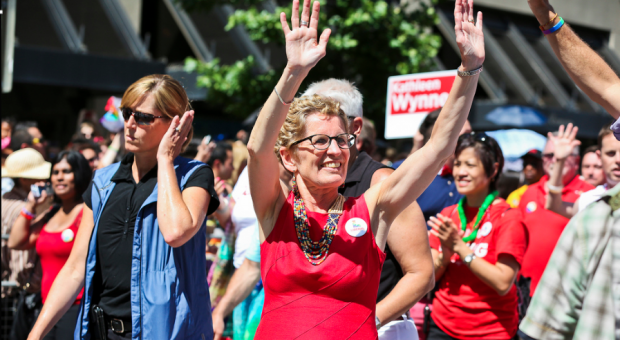Activists are planning to picket Egale Canada‘s $300-a-plate annual gala Sept 27 to protest the organization’s awarding of its 2013 LGBT Leadership Award to Ontario Premier Kathleen Wynne.
The event at the Ritz-Carlton Hotel is a fundraiser for the Egale Canada Human Rights Trust (ECHRT), a national charity that promotes LGBT rights.
The group announced that Wynne will receive the award just days after some community members expressed concerns about Egale executive director Helen Kennedy’s announcement that she had joined the Liberal Party. Kennedy made the announcement during a Sept 15 speech at the Toronto Centre Liberal Party nomination meeting.
Egale presents the award annually to a Canadian whose leadership has advanced LGBT human rights both at home and abroad.
Activist Zach NoCameco Ruiter, who is organizing the protest, says the optics are bad. “What has Kathleen Wynne done to use her power for queer people?” he says. “Has she put pressure on Russia? Called for the release of Tarek Loubani and John Greyson? Has she advocated for a shelter for LGBT homeless youth? Why is she getting this award? It’s time to make demands of her, not reward her.”
Ruiter isn’t the only one questioning Egale’s decision. Denis LeBlanc, the organization’s president from 1992 until 1994, says Wynne has been silent on two key queer issues — HIV criminalization and the Ontario sexual health education curriculum.
“The criteria for this award is presented to someone who has advanced the LGBT community at home or abroad,” he says. “I’ve been scratching my head here. Well, she’s a role model. Just being a gay personality doesn’t seem sufficient for a human rights award.”
But Kennedy defends the choice to honour Wynne, noting she is hopeful the premier will tackle the issues of outdated sex education and HIV criminalization in the province. “These are issues that should be on the table and discussed and advanced,” she says. “And if they aren’t on the table, it’s up to the opposition parties to make them election issues. I agree, we need to push on that.”
She says Wynne is an excellent choice for the honour because she is Ontario’s first female premier and Canada first openly gay premier.
Wynne is a powerful role model for queer people, especially women, Kennedy says. “She showed that you can actually be out and have a political career. She’s the first openly gay, progressive woman to be elected as premier in Canada, and I think that says something, and I think that should be celebrated.
“The decision to give the award to Kathleen was made a long time ago, long before I nominated Todd Ross,” she adds.
But LeBlanc, who made a point of being “publicly non-partisan” during his tenure at Egale, says he is extremely disappointed that Kennedy has declared she is a member of a political party.
“These are ethical questions, and they are important,” he says.
For her part, Kennedy says her personal political affiliation is separate from her position as the public face of the officially non-partisan Egale. As a charitable organization, Egale is allowed under the law to lobby the government and advocate policies, but it must do so in a strictly non-partisan way. “And the public face of Egale is still non-partisan,” she says. “In my work, it has no bearing on when I negotiate with a Tory government in Newfoundland and Labrador, a Tory government in New Brunswick, and NDP government in Manitoba, a Liberal government in Ontario. It has never influenced the work that we do.”
Mark Smith, a member of the Queer Liberals, says there is a distinct difference between being political in one’s personal life, even supporting candidates privately, and being a member of a party and making public statements. “I have no issue with her working in the background,” he says. “Being so public about it, it becomes an endorsement.”
Smith says Kennedy’s position could compromise Egale’s lobbying efforts. “Once you become a party member, you are not expected to ask questions or poke holes in the policy. You can ask questions behind closed doors, but you can’t openly criticize. You have to toe the party line.”
But Egale Canada president Robert Leckey says he is confident in Kennedy’s ability to separate her public political life from her private political life when lobbying.
“We engage and network and lobby politicians of all stripes,” he says.
Still, former Egale executive director Gilles Marchildon says, being publicly supportive of one party over another affects all decisions, such as the choice to give Wynne the award.
“I was always very aware of the desirability for me to be perceived to be non-partisan. This is different from her life as an individual. As an individual we can vote. We can donate. But I certainly wouldn’t have done the same thing as Helen, but that’s her prerogative . . . Once you state publicly that you have a political affiliation, it colours everything.”
“Some people thought I was a Liberal, others thought I was NDP,” he adds. “Funny, no one ever thought I was a Conservative.”

 Why you can trust Xtra
Why you can trust Xtra


